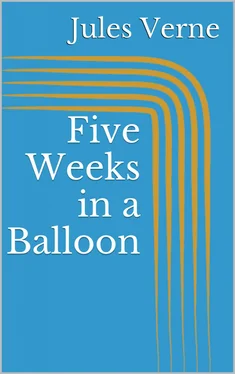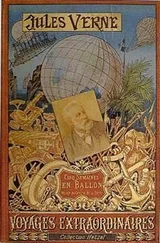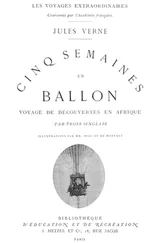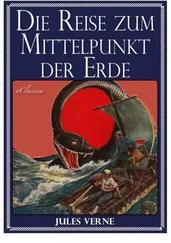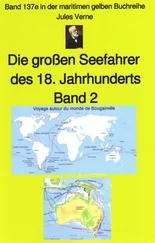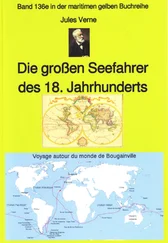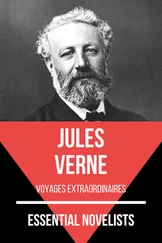"Come, come," said he, at last. "Let us see, Samuel. Then you have discovered the means of guiding a balloon?"
"Not by any means. That is a Utopian idea."
"Then, you will go—"
"Whithersoever Providence wills; but, at all events, from east to west."
"Why so?"
"Because I expect to avail myself of the trade-winds, the direction of which is always the same."
"Ah! yes, indeed!" said Kennedy, reflecting; "the trade-winds—yes—truly—one might—there's something in that!"
"Something in it—yes, my excellent friend—there's EVERY THING in it. The English Government has placed a transport at my disposal, and three or four vessels are to cruise off the western coast of Africa, about the presumed period of my arrival. In three months, at most, I shall be at Zanzibar, where I will inflate my balloon, and from that point we shall launch ourselves."
"We!" said Dick.
"Have you still a shadow of an objection to offer? Speak, friend Kennedy."
"An objection! I have a thousand; but among other things, tell me, if you expect to see the country. If you expect to mount and descend at pleasure, you cannot do so, without losing your gas. Up to this time no other means have been devised, and it is this that has always prevented long journeys in the air."
"My dear Dick, I have only one word to answer—I shall not lose one particle of gas."
"And yet you can descend when you please?"
"I shall descend when I please."
"And how will you do that?"
"Ah, ha! therein lies my secret, friend Dick. Have faith, and let my device be yours—'Excelsior!'"
"'Excelsior' be it then," said the sportsman, who did not understand a word of Latin.
But he made up his mind to oppose his friend's departure by all means in his power, and so pretended to give in, at the same time keeping on the watch. As for the doctor, he went on diligently with his preparations.
Chapter Fourth.
African Explorations.—Barth, Richardson, Overweg, Werne, Brun-Rollet, Penney, Andrea, Debono, Miani, Guillaume Lejean, Bruce, Krapf and Rebmann, Maizan, Roscher, Burton and Speke.
The aerial line which Dr. Ferguson counted upon following had not been chosen at random; his point of departure had been carefully studied, and it was not without good cause that he had resolved to ascend at the island of Zanzibar. This island, lying near to the eastern coast of Africa, is in the sixth degree of south latitude, that is to say, four hundred and thirty geographical miles below the equator.
From this island the latest expedition, sent by way of the great lakes to explore the sources of the Nile, had just set out.
But it would be well to indicate what explorations Dr. Ferguson hoped to link together. The two principal ones were those of Dr. Barth in 1849, and of Lieutenants Burton and Speke in 1858.
Dr. Barth is a Hamburger, who obtained permission for himself and for his countryman Overweg to join the expedition of the Englishman Richardson. The latter was charged with a mission in the Soudan.
This vast region is situated between the fifteenth and tenth degrees of north latitude; that is to say, that, in order to approach it, the explorer must penetrate fifteen hundred miles into the interior of Africa.
Until then, the country in question had been known only through the journeys of Denham, of Clapperton, and of Oudney, made from 1822 to 1824. Richardson, Barth, and Overweg, jealously anxious to push their investigations farther, arrived at Tunis and Tripoli, like their predecessors, and got as far as Mourzouk, the capital of Fezzan.
They then abandoned the perpendicular line, and made a sharp turn westward toward Ghat, guided, with difficulty, by the Touaregs. After a thousand scenes of pillage, of vexation, and attacks by armed forces, their caravan arrived, in October, at the vast oasis of Asben. Dr. Barth separated from his companions, made an excursion to the town of Aghades, and rejoined the expedition, which resumed its march on the 12th of December. At length it reached the province of Damerghou; there the three travellers parted, and Barth took the road to Kano, where he arrived by dint of perseverance, and after paying considerable tribute.
In spite of an intense fever, he quitted that place on the 7th of March, accompanied by a single servant. The principal aim of his journey was to reconnoitre Lake Tchad, from which he was still three hundred and fifty miles distant. He therefore advanced toward the east, and reached the town of Zouricolo, in the Bornou country, which is the core of the great central empire of Africa. There he heard of the death of Richardson, who had succumbed to fatigue and privation. He next arrived at Kouka, the capital of Bornou, on the borders of the lake. Finally, at the end of three weeks, on the 14th of April, twelve months after having quitted Tripoli, he reached the town of Ngornou.
We find him again setting forth on the 29th of March, 1851, with Overweg, to visit the kingdom of Adamaoua, to the south of the lake, and from there he pushed on as far as the town of Yola, a little below nine degrees north latitude. This was the extreme southern limit reached by that daring traveller.
He returned in the month of August to Kouka; from there he successively traversed the Mandara, Barghimi, and Klanem countries, and reached his extreme limit in the east, the town of Masena, situated at seventeen degrees twenty minutes west longitude.
On the 25th of November, 1852, after the death of Overweg, his last companion, he plunged into the west, visited Sockoto, crossed the Niger, and finally reached Timbuctoo, where he had to languish, during eight long months, under vexations inflicted upon him by the sheik, and all kinds of ill-treatment and wretchedness. But the presence of a Christian in the city could not long be tolerated, and the Foullans threatened to besiege it. The doctor, therefore, left it on the 17th of March, 1854, and fled to the frontier, where he remained for thirty-three days in the most abject destitution. He then managed to get back to Kano in November, thence to Kouka, where he resumed Denham's route after four months' delay. He regained Tripoli toward the close of August, 1855, and arrived in London on the 6th of September, the only survivor of his party.
Such was the venturesome journey of Dr. Barth.
Dr. Ferguson carefully noted the fact, that he had stopped at four degrees north latitude and seventeen degrees west longitude.
Now let us see what Lieutenants Burton and Speke accomplished in Eastern Africa.
The various expeditions that had ascended the Nile could never manage to reach the mysterious source of that river. According to the narrative of the German doctor, Ferdinand Werne, the expedition attempted in 1840, under the auspices of Mehemet Ali, stopped at Gondokoro, between the fourth and fifth parallels of north latitude.
In 1855, Brun-Rollet, a native of Savoy, appointed consul for Sardinia in Eastern Soudan, to take the place of Vaudey, who had just died, set out from Karthoum, and, under the name of Yacoub the merchant, trading in gums and ivory, got as far as Belenia, beyond the fourth degree, but had to return in ill-health to Karthoum, where he died in 1857.
Neither Dr. Penney—the head of the Egyptian medical service, who, in a small steamer, penetrated one degree beyond Gondokoro, and then came back to die of exhaustion at Karthoum—nor Miani, the Venetian, who, turning the cataracts below Gondokoro, reached the second parallel—nor the Maltese trader, Andrea Debono, who pushed his journey up the Nile still farther—could work their way beyond the apparently impassable limit.
In 1859, M. Guillaume Lejean, intrusted with a mission by the French Government, reached Karthoum by way of the Red Sea, and embarked upon the Nile with a retinue of twenty-one hired men and twenty soldiers, but he could not get past Gondokoro, and ran extreme risk of his life among the negro tribes, who were in full revolt. The expedition directed by M. d'Escayrac de Lauture made an equally unsuccessful attempt to reach the famous sources of the Nile.
Читать дальше
